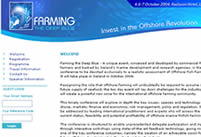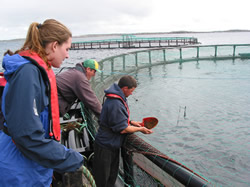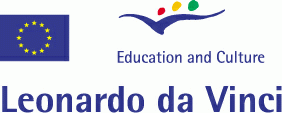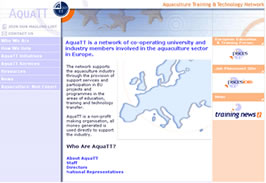

Training News - June 2004
Author: AquaTT
Date: 30 Jun 2004
JUNE 2004 A free e-mail news service provided by AquaTT on European Education & Training
in Aquaculture.
Contents
5. Student Corner
AquaTT recently launched its new website.
As well as containing information on all the current and past initiatives that AquaTT has been involved in over the years it also has many new features, Highlights include:
- Discussion Forum - Comprehensive Links Database - Photo Gallery - Training News Archive Facility The Face of European Education is changing rapidly - Are you up to date with the changes? Ministers responsible for higher education in 40 European countries will meet in Bergen 19-20th May 2005 to take stock of the progress of the Bologna Process since the Berlin meeting in September 2003 and to set directions for the further development towards the European Higher Education Area to be realised by 2010. AQUA-TNET, a thematic network for Aquaculture coordinated by AquaTT has been working hard to monitor the rapid developments and the impact it is going to have on Aquaculture related courses across Europe. To find out more about the network and the work it has been doing visit, http://www.piscestt.com/pisces/educational/intro_en.asp A Basic overview of what has been happening;(Source - http://www.bologna-bergen2005.no/)
Sorbonne 1998
In May 1998 the ministers in charge of higher education of France, Italy, the United Kingdom and Germany signed the so-called Sorbonne Declaration on the �harmonisation of the architecture of the European Higher Education System� at the Sorbonne University in Paris. Other European countries later subscribed to the Declaration. The Sorbonne Declaration focused on a progressive convergence of the overall framework of degrees and cycles in an open European area for higher education a common degree level system for undergraduates (Bachelor's degree) and graduates (Master's and doctoral degree) enhancing and facilitating student and teacher mobility (students should spend at least one semester abroad); removing obstacles for mobility and improving recognition of degrees and academic qualifications Bologna 1999
Convinced that the establishment of the European Higher Education Area would require constant support, supervision and adaptation to continuously evolving needs, the ministers decided to meet again in two years time. Prague 2001
In the Prague Communiqué the ministers reaffirmed their commitment to the objectives of the Bologna Declaration appreciated the active involvement of the European University Association (EUA)
and the National Unions of Students in Europe (ESIB) took note of the constructive assistance of the European Commission made comments on the further process with regard to the different objectives
of the Bologna Declaration emphasised as important elements of the European Higher Education Area:
The ministers decided that the next follow-up meeting of the Bologna Process should take place in 2003 in Berlin to review progress and to set directions and priorities for the next stages of the process towards the European Higher Education Area. Berlin 2003
Quality assurance
The two-cycle system
Recognition of degrees and periods of studies
The third cycle
Ministers charged the Follow-up Group with organising a stocktaking process in time for their summit in 2005 and undertaking to prepare detailed reports on the progress and implementation of the intermediate priorities set for the period. For more information visit http://www.bologna-bergen2005.no/ Call for proposals - Specific Support Actions for associated candidate countries The European Commission has published a call for proposals for Specific Support
Actions (SSAs) for associated candidate countries under the international cooperation
thematic priority of the Sixth Framework Programme (FP6) .
To see the full details of the call, please consult the following web address:http://fp6.cordis.lu/fp6/call_details.cfm?CALL_ID=146 back to top
The European Commission has published a call for proposals for Specific Support
Actions (SSAs) for targeted countries under the international cooperation thematic
priority of the Sixth Framework Programme (FP6) . SSAs will be implemented to
stimulate, encourage and facilitate the participation of organisations from those
targeted countries that have an S&T cooperation agreement with the EU or are
in the process of negotiating such an agreement in the activities of the seven
priority thematic areas of FP6.
The deadline for submitting proposal documents is 14.10.2004.
To see the full details of the call, please consult the following web address:
http://fp6.cordis.lu/fp6/call_details.cfm?CALL_ID=145
Value Added Seafood, London, UK, 30th September - 1st October 2004The market for value added seafood is booming, with record growth in 2003, and
further growth forecast for 2004. Total spend on seafood in the UK last year rose
8% to £1.8 billion pounds.
The challenge for seafood manufacturers and retailers is how to exploit this
demand by developing new products that provide high quality, convenient and nutritious
mealtime solutions.
This year, at our 3rd Value Added Seafood Conference, our expert speakers look
at how you can meet this challenge, from packaging and sustainable sourcing, to
quality and safety, traceability and consumer attitudes and behaviour.
● Hear the latest new product trends across the value added seafood sector ● Assess consumer attitudes and responses to value added seafood products ● Respond to changing consumer demands to increase revenue and profit ● Promote the nutritional benefits of seafood to educate consumers ● Network with senior industry executives from across Europe Source: Agra Europe
For more information visit:http://www.agra-net.com/NASA/ContentServer?pagename=agra/showEvent&id=20001019417  Invest In The Offshore Revolution
Farming the Deep Blue - A unique event, conceived and developed by commercial fish farmers and backed by Ireland’s marine development and research agencies, is the first conference to be devoted exclusively to a realistic assessment of Offshore Fish Farming. It will take place in Ireland in October 2004. Recognising the role that offshore farming will undoubtedly be required to assume
in the future supply of seafood, the two day event will lay down challenges for
the industry and will create a powerful new voice for the international offshore
farming community.
For more information visit http://www.eventznet./ac/bim/deepblue/ Global water resources and environmental change - information day, Brussels, 9th July An information day on global water resources and environmental change will take
place in Brussels, Belgium, on 9 July.
The event has been organised within the context of the deadline for the third call for proposals for projects under the 'global change and ecosystems' sub-priority of the Sixth Framework Programme (FP6), which falls on 26 October. The objective of the event is to present this topic as it is covered in the work programme, and to provide opportunities for networking between potential proposers. Participants will have the opportunity to discuss research gaps and to give a short presentation on project ideas. Source: Cordis For further information, please visit http://forum.europa.eu.int/Public/irc/rtd/eesdwatkeact/library?l=/infoday_resources&vm=detailed&sb=Title For administrative queries, please contact: Valérie Ubrich E-mail: Valerie.ubrich@cec.eu.int For scientific technical queries, please contact: Panagiotis Balabanis E-mail: panagotis.balabanis@cec.eu.int back to top Training courses on FP6 proposals, projects and eTIPs, Brussels, 1-3rd September 2004 Three training courses related to the Sixth Framework Programme will take place
in Brussels, Belgium, between 1 and 3 September.
Source : EARTO
Post your Student placement and MSc/ PhD vacancies on WWW.PISCESTTJOBS.COM
Upon registration, companies can post and instantaneously edit job vacancies, including permanent, temporary, MSc/PhD and student placement positions. Companies will only receive CVs of those applicants who are qualified for the position requirements. To ensure privacy and lessen the hassle of unsolicited calls and queries, company/organisation contact details will not be published online. Prospective employees can use the online registration facility to obtain a username and password, post and edit their employee profile, upload a CV and apply online for positions. If you are interested in posting a job vacancy or registering for the service, please contact aquatt@aquatt.ie AquaTT, the European Network for Education and Training, is providing the site as an additional service to compliment their flagship project, PISCES TT, found on the web at www.piscestt.com and host to a comprehensive education database, occupational profiles, virtual tours, a discussion forum, and marine sciences activities for children. back to topThe exams are over and you are looking forward to the long summer ahead. Maybe
you are thinking of looking for a job. Some work experience? AquaTT has been
active in the PROFET Workshop initiative which delivered 5 key theme workshops
to identify the RTD needs of the European fish farming sector. For further information
on this initiative you can visit http://www.aquamedia.org.

AquaTT’s participation took focus on promoting and identifying the training and mobility needs of the sector. The results of the overall PROFET workshop questionnaire clearly indicated that 80% of respondents are interested in hosting a student trainee placement. A demonstrated “eagerness to learn� was deemed the key attribute sought in the prospective student – something to bear in mind when taking that job interview. It is essential that as a student you build up a portfolio of experience taking
on, and actively seeking out training opportunities and hands-on experience.
This wealth of experience will serve to put you in an eligible position for getting
that job and it will also drive home to your employer that you are an active individual
with a true desire to work and learn. So what actions should you take at this
stage?
Find Funding 
Many employers are keen to provide training placements once the potential incoming student has some support funding. To this AquaTT would advise that you check out the Leonardo da Vinci Mobility Programmes which are run on a national basis and provide short-training periods for the student abroad. For further information, the programme’s national agencies can be accessed at: http://europa.eu.int/comm/education/programmes/leonardo/new/leonardo2/nalist2_en.html IAESTE – the International Association for the Exchange of Students for Technical Experience provides training placements during the summer months for bona fide students attending courses at universities, institutes of technology and similar institutions of higher education. For detailed information you can visit http://www.iaeste.org Be Proactive The key requirement to a good start on the career ladder is your ability to get relevant work experience. This requires proactive thinking and practice; so put yourself out there - approach local producers and related companies offering to work for a short period of time, in return you should request training in an area of specific interest to you and a recommendation/ reference detailing the jobs you carried out and the skills you developed during your training period. PISCESTT Jobs is AquaTT’s jobs and mobility service devised in response to the need to mediate the link between employers and students/ workers in the aquaculture industry. Register for free online at http://www.piscesttjobs.com where you can then apply directly to the advertised positions be they jobs, training placements or further study opportunities (MSc, PhD). Successful match placements have taken place and many students benefit from the experience of gaining a telephone or face-to-face interview, which again helps to build up and develop your portfolio, readying you for your desired position. This service is in continual development with plans to incorporate further useful sections and tools for managing and developing your career. This article marks the beginning of the Student Corner in Training News and we now welcome submissions from current students interested in presenting their views and experiences on the industry and education in Europe. The newsletter reaches 1900 recipients on a monthly basis and will serve as a good forum to get your ideas out to the differing sectors involved in the industry. An email stating your background and the potential title of your article should be sent to aquatt@aquatt.ie for review.
The main target audience for this newsletter is teachers, trainers and students in the aquaculture area but will also be of interest to policy makers, companies and associations. AquaTT welcomes any feedback regarding content, presentation and user-friendliness of the newsletter. Please forward this mail to any colleagues that may be interested. Please submit any relevant information for dissemination in the newsletter. DISCLAIMER: AquaTT provides this newsletter as a free service to interested parties. Most of the information is provided by AquaTT. Where it is not, the source of the news is provided in the text of the news brief or else AquaTT attributes the news to the coordinating body as the "Data Source Provider". In no way does this newsletter, by promoting events not coordinated by AquaTT, intend to wrongly or inappropriately claim projects, news, etc. as its own nor is it responsible for incorrect information provided from other sources. "Training News" is a promotional tool and forum for both AquaTT and other organisations. If you have received this e-mail in error or would like to unsubscribe please click on the link at the bottom of this email. |





 PISCES TT Jobs, an exciting and valuable free online service provided by AquaTT
UETP Ltd. to employers and potential employees in aquaculture and related science
sectors. Using a secure and innovative site format, employers and job searchers
can post job vacancies and CVs, respectively, thus facilitating human resource
development in the industry.
PISCES TT Jobs, an exciting and valuable free online service provided by AquaTT
UETP Ltd. to employers and potential employees in aquaculture and related science
sectors. Using a secure and innovative site format, employers and job searchers
can post job vacancies and CVs, respectively, thus facilitating human resource
development in the industry.  AquaTT through its extensive network has realised that essential information
on upcoming changes is not being effectively disseminated to all parties. Thus,
AquaTT is producing this free news service "TRAINING NEWS" specifically for the
Aquaculture industry. The newsletter is intended to keep you informed of developments
in Education & Training and related areas. Support material will be available
on the new European Education Forum website
AquaTT through its extensive network has realised that essential information
on upcoming changes is not being effectively disseminated to all parties. Thus,
AquaTT is producing this free news service "TRAINING NEWS" specifically for the
Aquaculture industry. The newsletter is intended to keep you informed of developments
in Education & Training and related areas. Support material will be available
on the new European Education Forum website